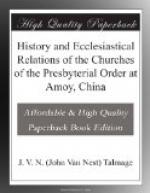It seems to us that the supposition takes for granted
that our Church in its Missionary work is influenced
by a desire for self-glory, or self-gratification;
or, at least, that she is not a Church of liberal views—that
she is not at all to be compared, in this respect,
with the English Presbyterian Church, or the Free
Church of Scotland. Allusion has already been
made to the liberality of the English Presbyterian
Church. I may now also remark that a large amount
of the funds for carrying on the work at Amoy is raised
in Scotland from members of the Free Church. They
never had any idea that the churches gathered in China
were to be a part of their own Church. They do
not even ask that they be a part of their sister Church
in England. They only ask that they shall be sound
in the faith and hold to the essentials of Presbyterianism,
even though they have some characteristics peculiar
to the Dutch and other Reformed Churches. These
Presbyterian brethren in England and Scotland are not
only ready to support their own Missionaries in their
work of building up the churches under their especial
care, but they stand ready to assist the Missionaries
of our Church in building up the churches under our
especial care. Of their frequent offers to assist
us, when they feared we should be in want of funds,
our Board can bear testimony. We are not yet
willing to believe that our people are a people of
narrow views in a matter like this. It is contrary
to our history in time past. It is contrary to
the facts of the present day. It is contrary to
all my observation among our churches. Our people
do not first ask whether it be building ourselves
up, before they sympathize with a benevolent object.
We believe the contrary is the exact truth. It
requires a liberal policy to call forth liberal views
and action. As regards the enlisting of men,
look at the facts. Every man who has gone out
from among you, to engage in this Missionary work,
begs of you not to adopt a narrow policy. So
in regard to obtaining of funds. Usually, the
men who are most liberal in giving are most liberal
in feeling. This must be so in the very nature
of things. The way to alienate the sympathies
of the Church from the Mission at Amoy is to divide
the Church there by a sectarian policy; and the way
to enlist her sympathies is to continue the former
plan, and let the work go forward with the Divine blessing
as in days past. The people will be more encouraged,
and praise God more heartily, when you tell them of
six organized churches like our own, and many others
growing up all around, than they will if you tell them
of only three churches, and only a few out-stations,
under our care. They will not object to hear
that the English Presbyterian brethren are laboring
with us, and organizing churches so nearly like our
own. However powerful the motive addressed to
the desire to build up our own Church, there are motives
infinitely more powerful. Such are the motives
to be depended on in endeavoring to elevate the standard
of liberality among our people.




